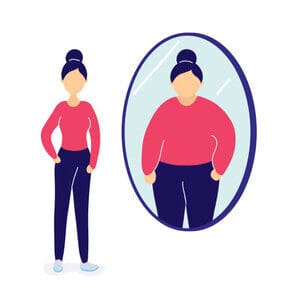Disordered Eating
- Home
- Disordered Eating
DISORDERED EATING THERAPY (ADULTS 18+)
Compassionate, weight-inclusive care for bingeing, restricting, purging, compulsive exercise, and body-image distress—grounded in science and nervous-system support.
UNDERSTANDING DISORDERED EATING
 Disordered eating spans a spectrum—from rigid rules and body checking to bingeing, restricting, purging, and compulsive exercise.
It’s often reinforced by diet culture, trauma, anxiety, perfectionism, and attempts to manage overwhelm. Because the **nervous system** and **nutrition** are tightly linked,
under-fueling raises stress hormones and intensifies obsessiveness and black-and-white thinking, while adequate nourishment expands calm, focus, and flexibility.
Disordered eating spans a spectrum—from rigid rules and body checking to bingeing, restricting, purging, and compulsive exercise.
It’s often reinforced by diet culture, trauma, anxiety, perfectionism, and attempts to manage overwhelm. Because the **nervous system** and **nutrition** are tightly linked,
under-fueling raises stress hormones and intensifies obsessiveness and black-and-white thinking, while adequate nourishment expands calm, focus, and flexibility.
- Common signs: preoccupation with food/weight, guilt or shame after eating, secretive behaviors, social avoidance, ritualized rules, or “making up for” food.
- Risk markers: dizziness/fainting, cold intolerance, GI issues, loss of menstruation, dental problems, injuries from over-exercise, or rapid weight change.
- Impact: mood instability, anxiety, irritability, attention/memory problems, sleep disruption, and strained relationships.
PSYCHOEDUCATION
- Nervous System & Restriction: caloric restriction sensitizes the brain to threat; eating regularly reduces alarm signals, making therapy skills “stick.”
- Binge–Restrict Cycle: restriction (biological + psychological) increases urges to binge; gentle, consistent nourishment lowers rebound eating.
- Compensatory Behaviors: purging, laxatives, or exercise “penance” provide short-term relief and long-term harm; we replace them with safer regulation tools.
- All-or-Nothing Thinking: rigid food rules keep the cycle going; exposure to flexibility rebuilds trust and spontaneity.
- Body Image: shame narrows life; values-led living and self-compassion expand meaning beyond appearance.
THERAPY OPTIONS AT ASTUTE

- CBT-E / DBT Skills
- Target rules/rituals, emotion regulation, and distress tolerance; build balanced routines and flexible thinking.
- ACT & Self-Compassion
- Shift from body control to values-based actions; reduce avoidance and perfectionism.
- Trauma-Informed Approach
- Prioritize safety, consent, pacing, and autonomy while processing shame and relational injuries.
- Coordinated Medical & Dietitian Support
- When helpful, we collaborate for medical monitoring and gentle, sustainable nutrition plans.
COORDINATED SUPPORT

- Medical monitoring and dietitian referrals as needed
- Psychiatric collaboration for co-occurring anxiety/depression
- Optional skills groups and wellness classes to reinforce routines
WHAT TO EXPECT
- Stabilize: safety planning, regular eating, sleep support, and nervous-system tools.
- Rebuild: flexibility with food and movement; body respect; values-based routines.
- Maintain: relapse-prevention plan, support network, and gradual independence.
WHY CHOOSE ASTUTE
- Weight-inclusive, shame-free, evidence-based care
- Trauma-informed, paced to your consent and comfort
- Onsite holistic services to support regulation and sleep
- In-person and telehealth options
HOLISTIC SERVICES AT ASTUTE

- Yoga Therapy (Gentle/Restorative)
- Breath-led, consent-centered movement to improve interoception, reduce tension, and support sleep.
- Somatic Movement
- Slow, non-striving patterns to release bracing and reconnect with hunger/fullness cues.
- Sound Bath
- Deep relaxation to quiet rumination, down-regulate the nervous system, and support recovery sleep.
- Reiki
- Calming, low-stimulus sessions to reduce physiological arousal and complement therapy work.
Note: Holistic services are supportive adjuncts and do not replace medical or nutritional care.
IN CRISIS?
If you are in crisis, please contact your nearest ER immediately.National Suicide & Crisis Lifeline: 988 • Text: HOME to 741741
Video Resource

Signs and symptoms of disordered eating may include, but are not limited to:
Frequent dieting, anxiety associated with specific foods or meal skipping
Chronic weight fluctuations
Rigid rituals and routines surrounding food and exercise
Feelings of guilt and shame associated with eating
Preoccupation with food, weight and body image that negatively impacts quality of life
A feeling of loss of control around food, including compulsive eating habits
Using exercise, food restriction, fasting or purging to “make up for bad foods” consumed

Many people who suffer with disordered eating patterns either minimize or do not fully realize the impact it has on their mental and physical health. This lack of understanding may unnecessarily exacerbate the harm of disordered eating. Detrimental consequences can include a greater risk of obesity and eating disorders, bone loss, gastrointestinal disturbances, electrolyte and fluid imbalances, low heart rate and blood pressure, increased anxiety, depression and social isolation.
Disordered eating is a serious health concern that may be difficult to detect since a person with disordered eating patterns may not display all of the classic symptoms typically identified with eating disorders. It’s important to remember that even a person exhibiting disordered eating habits and behaviors also may be experiencing significant physical, emotional and mental stress.
Registered dietitian nutritionists are vital to the detection and treatment of disordered eating. Often, patients referred to dietitians for nutrition counseling are unaware that their eating patterns are problematic or harmful. Working with a dietitian who has a background in counseling patients with eating disorders is an important step in treating disordered eating and preventing it from progressing to an eating disorder.
https://www.eatright.org/health/diseases-and-conditions/eating-disorders/what-is-disordered-eating
At Astute Counseling Services, we practice “Body Positive” interventions to treat Disordered Eating with an emphasis on self love, gaining control back, general health and happiness.